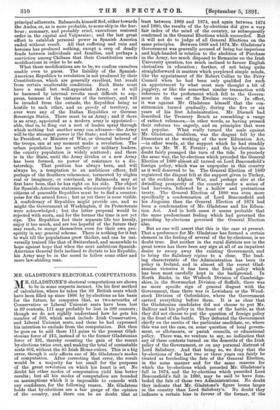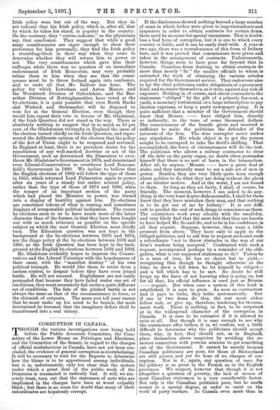MR. GLADSTONE'S ELECTORAL COMPUTATIONS.
MR. GLADSTONE'S electoral computations are shown to be in some respects inexact. On his first method of calculation, where he takes the 89 British seats which have been filled up since 1886 by by-elections as his basis for the future, he computes that, as two-sevenths of Conservative or Liberal Unionist seats have been lost in 89 contests, 111 may probably be lost in 389 contests ; though we do not rightly understand how he gets his number of 389, which must include Irish Conservative, and Liberal Unionist seats, and these he had expressed his intention to exclude from the computation. But then he goes on to add these 111 gains to the present Glad- stonian force of 213, instead of to the former Gladstonian force of 191, thereby counting the gain of the recent by-elections twice over, and making the total of contestable seats 602, without the 85 Irish Home-rulers. This is a big error, though it only affects one of Mr. Gladstone's modes of computation. After correcting that error, the result would be a majority far too small for the purposes of the great revolution on which his heart is set. No doubt his other modes of computation yield him better results ; but all his modes of computation are founded on assumptions which it is impossible to concede with any confidence, for the following reason. Mr. Gladstone holds that by-elections are a fair gauge of the opinion of the country, and there can be no doubt that at principal adherents. Balmaceda himself fled, either towards least between 1868 and 1874, and again between 1874 and 1880, the results of the by-elections did give a very fair index of the mind of the country, as subsequently confirmed in the General Elections which succeeded. But it will not do to judge of all General Elections on the same principles. Between 1868 and 1874, Mr. Gladstone's Government was generally accused of being too imperious and high-handed in relation to the abolition of Purchase in the Army, too much disposed to Romanise on the Irish University question, too much inclined to favour English clericalism in education ; further, of not being quite straightforward in matters which perplexed simple minds, like the appointment of Sir Robert Collier to the Privy Council when he had been only qualified for such an appointment by what most men thought a bit of jugglery, or like the somewhat similar transaction with reference to the preferment which fell to the Govern- ment in the case of the Ewelme rectory. In effect, it was against Mr. Gladstone himself that the con- stituencies turned gradually, during the five or six years of his first Administration. Mr. Disraeli had described the Treasury Bench as resembling a range of extinct volcanoes,—in other words; as having pressed their reforms too eagerly, and on principles that were not popular. What really turned the scale against Mr. Gladstone, doubtless, was the disgust felt by the Dissenters at the working of the mew Education Act, —in other words, at the support which he had steadily given to Mr. W. E. Forster ; and the by-elections no doubt fairly presaged the turn of the tide. In precisely the same way, the by-elections which preceded the General Election of 1880 almost all turned on Lord Beaconsfield's foreign policy, which was as unpopular in this country as it well deserved to be. The General Election of 1880 registered the disgust felt at the support given to Turkey, at the reckless Afghan War, and perhaps also at the dwindling prosperity of the country under a series of bad harvests, followed by a hollow and pretentious treaty. The General Election of 1880 was even more specifically a condemnation of Lord Beaconsfield and his Jingoism than the General Election of 1874 had been a condemnation of Mr. Gladstone and his Educa- tion Act. And in both cases it seems probable that the same predominant feeling which had governed the preceding -by-elections governed the General Election also.
But no one will assert that this is the case at present. That a preference for Mr. Gladstone has formed a certain element in the feeling of several of the by-elections, is no doubt true. But neither in the rural districts nor in the great towns has there been any sign at all of an impatient desire to sweep away the existing Government, and to bring the Salisbury regime to a close. The lead- ing characteristic of the Administration has been its policy in Ireland, and in almost all the recent Glad- stonian victories it has been the Irish policy which has been most carefully kept in the background. In North Bucks, in the Wisbech Division of Cambridge- shire, in the Stowmarket Division of Suffolk, there was no more specific sign of general disgust with the Government, than there was in Lewisham or the Wood- stock Division of Oxfordshire, where the Government carried everything before them. It is as clear that the Gladstonian candidates did not choose to put Mr. Balfour and his policy in the front of. the battle, as that they did not choose to put the question of foreign policy in the front of the battle. They defeated the Government chiefly on the merits of the particular candidate, or, where this was not the case, on some question of local govern- ment, or allotments, or parish councils, or educational policy. There was, we venture to say, no indication that any of these contests turned on the demerits of the Irish policy of the Government, or on any personal distrust of Lord Salisbury. And that being so, we deny that the by-elections of the last two or three years can fairly be treated as foreboding the fate of the General Election, in the same manner and for the same reasons for which the by-elections which preceded Mr. Gladstone's fall in 1874, and the by-elections which preceded Lord Beaconsfield's fall in 1880, may be said to have fore- boded the fate of those two Administrations. No doubt they indicate that Mr. Gladstone's figure looms larger in the country than Lord Salisbury's. No doubt they indicate a certain bias in favour of the former, if the Irish policy were but out of the way. But they do not indicate that his Irish policy, which is, after all, that by which he takes his stand, is popular in the country. On the contrary, they " contra-indicate," as the physicians say, that conclusion. They suggest that while a good. many constituencies are eager enough to show their preference for him personally, they find the Irish policy a stumbling-block in their way when they come to determine whether they will return him to power or not. The very constituencies which gave him their suffrages while there was no question of an immediate endorsement of Irish Home-rule, may very probably refuse them to him when they see that the conse- quence must -be to throw Ireland again into confusion, and to undo all that Mr. Balfour has done. The .policy for which Lewisham and Aston Manor, and the Woodstock Division of Oxfordshire, and the Bas- setlaw Division of Nottinghamshire, have voted at the by-elections, it is quite possible that even North Bucks and Wisbech and Stowmarket will be disposed to vote for at the General Election, even though they would fain repeat their vote in favour of Mr. Gladstone, if the Irish Question did not stand in the way. There is absolutely nothing to suggest that in so much as 10 per cent. of the Gladstonian triumphs in England the issue of the election turned chiefly on the Irish Question, and repre- sented the deliberate opinion of the electors that the policy of the Act of Union ought to be reopened and reversed. In England at least, there is no prevalent desire for the repudiation of any well-marked doctrine or act of the Government, such as determined the Dissenters to over- throw Mr. Gla,dstone's Government in 104, and determined even Liberal-Conservatives to overthrow Lord Beacons- field's Government in 1880. We incline to believe that the English elections of 1892 will follow the type of those in 1865, which returned Lord Palmerston again to power after six years of a steady but rather neutral policy, rather than the type of those of 1874 and 1880, when the temper of an important section of the party which had placed the Minister in power, was turned into a display of hostility against him. By-elections are sometimes tokens of what is coming, and sometimes displays of irresponsible political inclination. The recent by-elections seem to us to have much more of the latter character than of the former, in that they have been fought out with as much reticence as possible on the specific subject on which the next General Election must chiefly turn. The Education question was not kept in the background at the by-elections between 1870 and 1874, nor the Jingo policy at the by-elections between 1876 and 1880, as the Irish Question has been kept in the back- ground at the English by-elections between 1888 and 1892.
Mr. Gladstone evidently hopes to impress the Conser- vatives and the Liberal -Unionists with the hopelessness of their cause, with the " manifest destiny " of his own political triumph. He would like them to retire from a useles&contest, to despair before they have even joined battle. He will not succeed. Englishmen are not easily persuaded that because they have failed under one set of conditions, they must necessarily fail under a quite different set of conditions. The fate of the pitched battle is not always the same as that of the reconnaissance in force, or the skirmish of outposts. The more you tell your enemy that he must make up his mind to be beaten, the more determined he becomes that the imaginary defeat shall be transformed into a real victory.



































 Previous page
Previous page